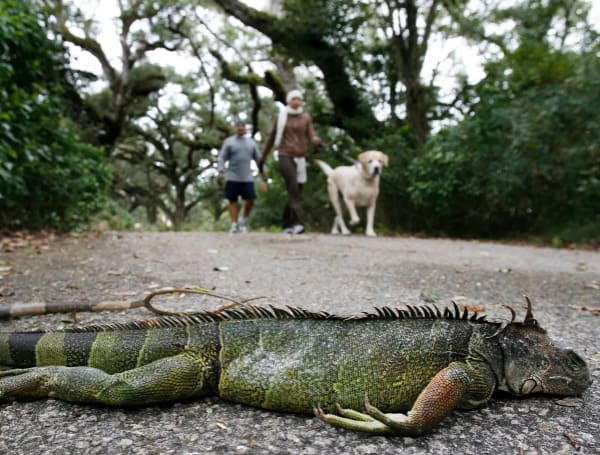If you’re in South Florida, you may have woken up to paralyzed Iguanas on the sidewalk or your driveway.
Iguanas are cold-blooded animals, and when the temps drop, they have a tendency to fall from trees and plunge to the ground.
These cold-blooded reptiles turn into a state of hibernation when it gets really cold, losing all control of their motor skills.
But not to worry, these lizards aren’t dead, but instead in frozen pose vital for their survival. Think Han Solo in Carbonite.
When temperatures drop below 45 degrees Fahrenheit, iguanas go into a dormant state. It is their bodies’ way of protecting them until the temperature warms back up above 50 degrees.
They’re still breathing, with critical body functions still operating.
“They may fall from trees, but they are not dead,” the National Weather Service in Miami told CNN.
In the news: Phoenix Business Owner Takes On City, Claiming City Is Allowing NFL To Bully Businesses Over Advertising
But watch out above. Iguanas sleep in the trees, and when they enter the paralyzed state, they tend to roll of the branches and smack into what’s below. People, pavement, and vehicles.
Male green iguanas can grow to over five feet in length and weigh up to 17 pounds. Females can also reach five feet in length but usually do not exceed seven pounds, so if one were to fall on you, yeah, it would hurt.
Severe cold can be hazardous to iguanas, too. If temperatures stay in the 40s or colder for longer than eight hours, some iguanas will die – especially the smaller ones.
Green iguanas are not native to Florida and are considered an invasive species due to their impact to native wildlife.
Like all nonnative reptile species, green iguanas are not protected in Florida except by anti-cruelty law and can be humanely killed on private property with landowner permission. This species can be captured and humanely killed year-round and without a permit or hunting license on 25 public lands in south Florida.
Green iguanas were added to Florida’s Prohibited species list.
Android Users, Click Here To Download The Free Press App And Never Miss A Story. Follow Us On Facebook Here Or Twitter Here.

